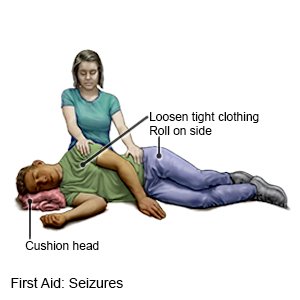Status Epilepticus
Medically reviewed by Drugs.com. Last updated on Aug 4, 2025.
Status epilepticus is a seizure that lasts longer than 5 minutes. It can also be a second seizure before you are fully awake and aware after the first. A tonic-clonic (grand mal) seizure is the most common type that leads to status epilepticus. This type of seizure causes loss of consciousness and convulsions. Status epilepticus is a medical emergency. It can cause permanent brain damage or death.
DISCHARGE INSTRUCTIONS:
Have someone else call 911 if:
- You have another seizure that lasts longer than 5 minutes.
- You have a second seizure that happens within 24 hours of your first.
- You have trouble breathing after a seizure.
- You cannot be woken after a seizure.
- You have a seizure in water, such as a swimming pool or bath tub.
- You have diabetes or are pregnant and have a seizure.
- You have more than 1 seizure before you are fully awake or aware.
Seek care immediately if:
- You are injured during a seizure.
Contact your healthcare provider if:
- You start to have seizures more often.
- You feel extremely sad, anxious, or are unable to cope with your condition.
- You have questions or concerns about your condition or care.
Related medications
Treatment options
The following list of medications are related to or used in the treatment of this condition.
Medicines:
You may be given the following:
- Antiepileptic medicine may control or prevent another seizure. Do not stop taking this medicine without direction from a healthcare provider. Another person may need to give you rescue medicine to stop a seizure at home. Ask your healthcare provider for more information about rescue medicine.
- Take your medicine as directed. Contact your healthcare provider if you think your medicine is not helping or if you have side effects. Tell your provider if you are allergic to any medicine. Keep a list of the medicines, vitamins, and herbs you take. Include the amounts, and when and why you take them. Bring the list or the pill bottles to follow-up visits. Carry your medicine list with you in case of an emergency.
What you can do to help prevent another episode of status epilepticus:
- Take your medicine every day at the same time. This will help prevent seizures. Use an alarm to help you remember to take your medicine. Do not skip any doses or take less than directed.
- Identify and avoid your seizure triggers. Common triggers include alcohol, drugs, flashing lights, and moving patterns. Talk to your healthcare provider if you need help to quit using drugs or drinking alcohol.
- Drink plenty of liquids and eat a variety of healthy foods. Dehydration and poor nutrition can trigger a seizure. Healthy foods include fruits, vegetables, whole-grain breads, low-fat dairy products, beans, lean meats, and fish. Ask if you need to be on a special diet. Also ask how much liquid you need each day and which liquids are best for you.
- Manage stress. A large amount of stress can increase your risk for a seizure. Do activities that help relax you such as yoga, reading, or meditation. Talk to your healthcare provider if you think you need therapy or other ways to manage your stress.
- Set a sleep schedule. A lack of sleep is a powerful trigger of seizures in some people. Try to go to sleep and wake up at the same times every day. Keep your bedroom quiet and dark. Talk to your healthcare provider if you have trouble sleeping.
What others can do to keep you safe if you have another seizure:
Give the following instructions to family, friends, and coworkers:
- Do not panic.
- Do not hold me down or put anything in my mouth.
- Gently guide me to the floor or a soft surface.
- Place me on my side to help prevent me from swallowing saliva or vomit.

- Protect me from injury. Remove sharp or hard objects from the area surrounding me, or cushion my head.
- Loosen the clothing around my head and neck.
- Time how long my seizure lasts. Call 911 if my seizure lasts longer than 5 minutes or if I have a second seizure.
- Stay with me until my seizure ends. Let me rest until I am fully awake.
- Perform CPR if I stop breathing or you cannot feel my pulse.
- Do not give me anything to eat or drink until I am fully awake.
Carry medical alert identification:
Wear medical alert jewelry or carry a card that says you have seizures. Ask your neurologist where to get these items.
 |
Follow up with your neurologist as directed:
You will need blood tests to check the level of antiseizure medicine in your blood. Your neurologist may need to change or adjust your medicine. Write down your questions so you remember to ask them during your visits.
© Copyright Merative 2025 Information is for End User's use only and may not be sold, redistributed or otherwise used for commercial purposes.
The above information is an educational aid only. It is not intended as medical advice for individual conditions or treatments. Talk to your doctor, nurse or pharmacist before following any medical regimen to see if it is safe and effective for you.
Learn more about Status Epilepticus
Treatment options
Care guides
Medicine.com guides (external)
Further information
Always consult your healthcare provider to ensure the information displayed on this page applies to your personal circumstances.
